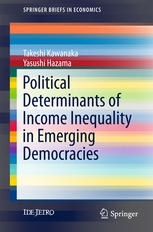

Most ebook files are in PDF format, so you can easily read them using various software such as Foxit Reader or directly on the Google Chrome browser.
Some ebook files are released by publishers in other formats such as .awz, .mobi, .epub, .fb2, etc. You may need to install specific software to read these formats on mobile/PC, such as Calibre.
Please read the tutorial at this link: https://ebookbell.com/faq
We offer FREE conversion to the popular formats you request; however, this may take some time. Therefore, right after payment, please email us, and we will try to provide the service as quickly as possible.
For some exceptional file formats or broken links (if any), please refrain from opening any disputes. Instead, email us first, and we will try to assist within a maximum of 6 hours.
EbookBell Team

4.3
8 reviewsThis study explores why democratization does not necessarily result in inequality reduction in emerging democracies and reveals the determinants of income inequality in emerging democracies, where the average level of inequality continues to be higher and where there is a larger variance of inequality levels than in advanced democracies. Apart from economic, demographic, and social factors, the book highlights political factors that obstruct redistributive policies. In contrast to conventional studies on advanced democracies, which emphasize the relations between different classes, this study asserts that several political factors cause malfunctioning of democratic institutions at various phases of the political process in emerging democracies: multidimensional preferences, the failure of the political market, and weak state capacity.
The book employs econometric methods to examine the effects of these political factors. The results indicate their significant effects. The multilevel analysis using the World Values Survey demonstrates that multidimensional preferences, operationalized as ethnic fractionalization, weaken demand for income inequality. Political market quality and state capacity are measured by the age of the largest opposition party, and the Quality of Government indicator is used for the unbalanced panel analysis covering the 1985–2012 period for 75 democracies. Both political market quality and state capacity reduce inequality, but the latter takes more time to show its effect.